August 27, 2022
The Skin and Stress Relation
How beneficial or harmful is The Skin and Stress Relation?
Our daily lives now include stress, but it can hurt your health when left unaddressed. In addition to having a bad effect on your immune system and raising your risk of heart disease, stress can also boost your probability of developing depression.
Your health might suffer from chronic stress in several ways. Headaches, exhaustion, and raised blood pressure are all symptoms of physiological imbalances. However, The Skin and Stress Relation can also affect your nails and hair.
Your face may also show signs of stress. It can show up as dry skin, wrinkles, acne, and hair fall, among other things. Respond to your body’s signals. Your skin and mind have a solid relationship. Skin problems linked to stress are genuine and are increasing. Acne, eczema, and psoriasis are well-recognized to worsen under pressure thanks to the body’s inflammatory pathways.
The Skin and Stress Relation
The Effects of Stress on Your Skin
1. Fine lines and wrinkles
Your skin’s collagen and elastin can degrade due to the stress hormone cortisol. Since these are what maintain skin’s elasticity and firmness, stress inadvertently causes more permanent wrinkles and fine lines.

2. Hyperpigmentation—and grey hairs
Sooner or later you will realize that hyperpigmentation has affected you. With aging, sun exposure, and stress, it grows dramatically. Stress can cause melanocytes in hair follicles to go grey and lose their pigment. In terms of skin, the opposite outcome is also possible: You could have lasting patches of skin that is rough or dark.

3. Acne
The stress hormone cortisol triggers the hypothalamus, a region of the brain, to create corticotrophin-releasing hormone (CRH). It is believed that CRH stimulates sebaceous glands near your hair follicles to release oil. These glands’ excessive oil production will clog your pores and cause acne.
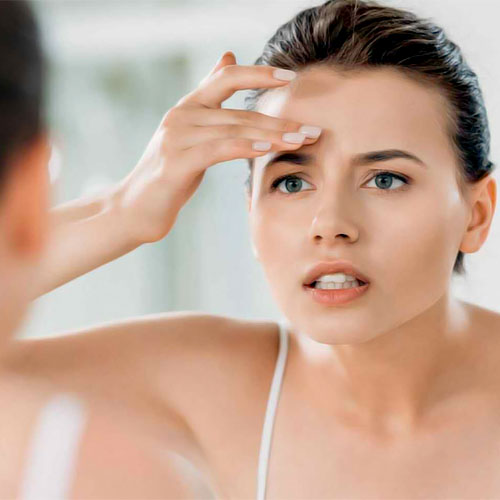
4. Weakens skin’s resilience and wound healing
In addition to the first negative effect on the skin (fine lines and wrinkles), diminished resilience also damages the skin’s protective barrier functions. As a result of stress, the skin is more vulnerable to damage from free radicals, allergens, and other external variables. Not to add, it hurts moisture absorption as well.

5. Dry skin
The outer layer of skin is called the stratum corneum. It has lipids and proteins that are essential for maintaining moisture in your skin cells. Additionally, it serves as a barrier to safeguard the skin. Your skin may get dry & itchy when your stratum corneum isn’t functioning properly. If you’re feeling particularly stressed, you may need to use more hyaluronic acid & moisturizer because your skin will have a hard time keeping moisture.
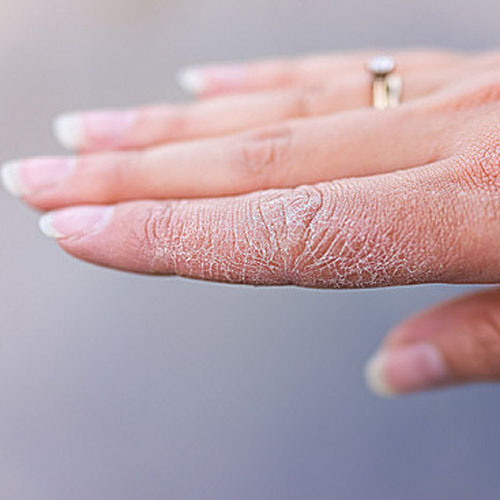
6. Hair fall
Telogen effluvium, a condition that alters hair’s growth cycle, is a result of persistent stress, a greater-than-usual amount of hair falls. Yes, it usually grows back, but during that time, hair may appear visibly thinner. On top, if you are already inclined to male-pattern baldness, it may also expedite severe loss. People under stress develop alopecia areata, in which the immune system attacks the hair follicles on the scalp, resulting in hair loss. However, this is usually temporary & once the stress pass, the hairs grow back from follicles.
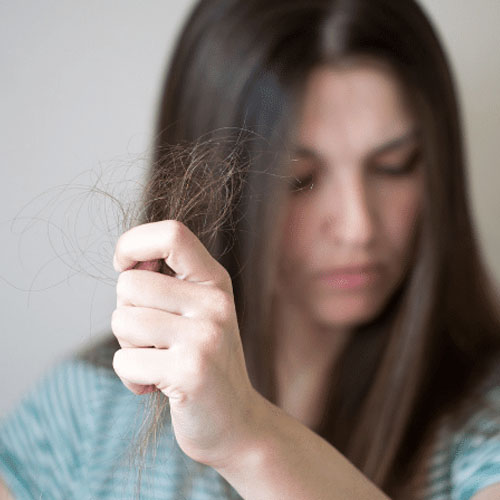
7. Dark circles and eye bags
Swelling or puffiness beneath your eyelids is a defining feature of bags under the eyes. Because the muscles that support your eyes deteriorate with age, they become more frequent. Eye bags can also result from skin sagging brought on by a loss of elasticity. Studies show that stress brought on by insufficient sleep accelerates wrinkles, elasticity loss, and uneven pigmentation. The same is true for dark circles, which can be avoided by giving this normally vulnerable and susceptible area of skin sufficient sleep, blood flow, and nutrient supply.
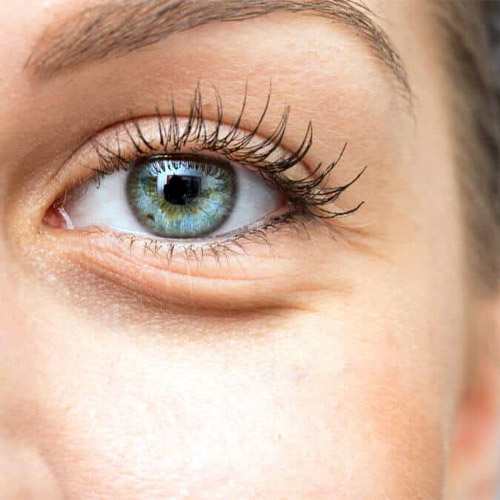
8. Skin dullness
Blood flow is reduced as a result of increased stress, which reduces the number of nutrients and oxygen that reach the skin. Additionally, the result of all this is skin that is less radiant and dull.
Even though it’s difficult to describe, you can recognize it when you see it: the skin seems blotchy, less vibrant, and may even be evenly discolored. (A good time to include Vitamin C in your skincare.)
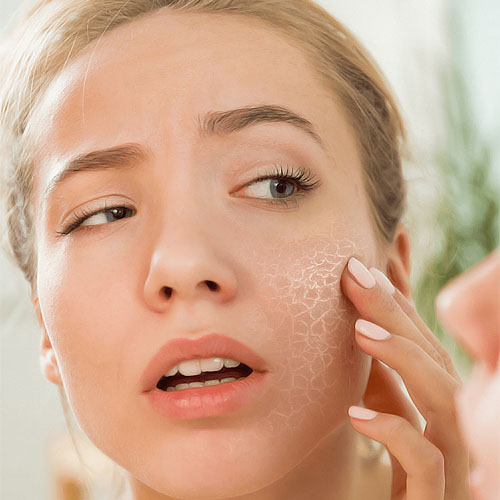
9. Rashes
Your immune system may be weakened by stress. Dysbiosis, or an imbalance of microorganisms in your stomach and on your skin, can result from a compromised immune system. This imbalance might cause your skin to get red or develop a rash when it happens.
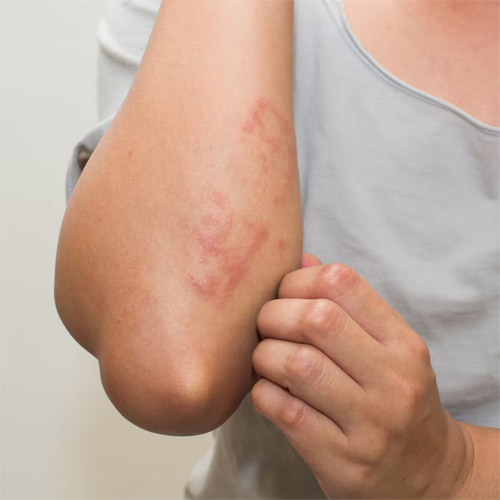
10. Dandruff
As previously indicated, stress can delay cellular turnover and increase oil production throughout the body, especially on the scalp. This is the ideal situation to have old, dead skin cells that are well past their prime in a setting that is ripe for a fungal infestation. Of course, flaking could result from this.
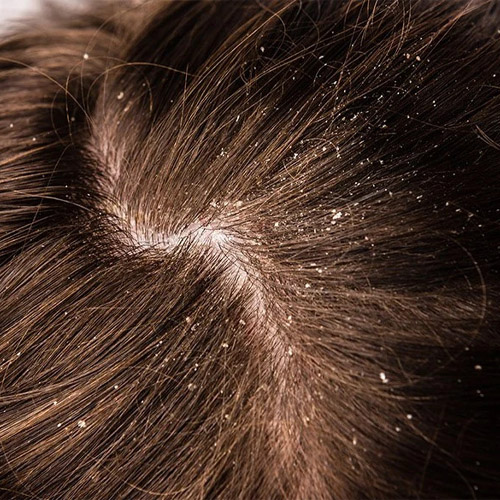
The Skin and Stress Relation
Other Effects of Stress

Damaged teeth – When they’re upset or concerned, many people develop the habit of brushing their teeth. Your teeth may suffer long-term harm as a result of this.

Flushed face – Changes in respiratory patterns might result from stress. Your face may momentarily flush due to these breathing patterns.

Bruised lips – When under stress, many people chew their lips or the inside of their mouths.

Temporomandibular joint dysfunction (TMD) – TMD is a series of medical conditions that have an impact on the joint where your jaw contacts your skull. It could result from often clenching your teeth.
Self-care advice for the issues caused by The Skin and Stress Relation
Skincare

Even when you’re stressed, continue your skincare regimen. Ensure simplicity. Use a mild cleanser to wash your face in the morning and at night. Apply sunscreen, use moisturizer, and don’t neglect topical medications, both prescribed and over-the-counter. It’s a good idea to set a reminder on your phone to help you stay focused.
Exercise

Whether it’s cycling, hiking, or online group fitness sessions, find something you want to do. Include some light yoga, regular stress-reduction exercises like deep breathing, and meditation. It benefits both your skin and general health. Bonus: Your energy, mood, and outlook will improve thanks to those feel-good workout hormones.
Diet

Avoid consuming substances including sweets, overly processed foods, and known food allergies. Concentrate on consuming a “rainbow” of fruits and vegetables, lean protein, healthy fats, and foods high in antioxidants like berries and avocado.
Sleep

Both lacks of sleep and stress can give you a worn-out, sickly appearance. It will be easier for you to handle daily stressors if you get enough sleep, which improves mood and cognition. Consistently try to get about 7-8 hours of sleep each night. Before going to bed, set aside an hour or two from your phone and other electronics.
Hydrate

Drinking lots of water keeps your skin hydrated and aids in the removal of toxins from the body. Additionally, staying away from alcohol and excessive coffee will improve your level of hydration.
Talk to a therapist or a trusted friend

Especially if you’re mental health is declining. It never hurts to seek expert assistance whether you are under stress over your finances, your marriage, or even a chronic skin problem. To assist you to manage times of high stress, cognitive behavioral therapy and other stress-reduction methods may be helpful.
The Skin and Stress Relation
Self-care techniques and at-home treatments can be a useful first line of defense, but if your skin issues continue, it might be time to see your dermatologist. Disorders brought on by The Skin and Stress Relation and flare-ups of psoriasis, rosacea, and eczema sometimes demand medical attention.
Try tracking symptoms if you’re having trouble determining the root of your skin problem. If your skin doesn’t clear up or gets worse, consult your dermatologist.
Choose your treatment or consult with the Best Dermatologist in Dubai at Esteem Medical Clinic
